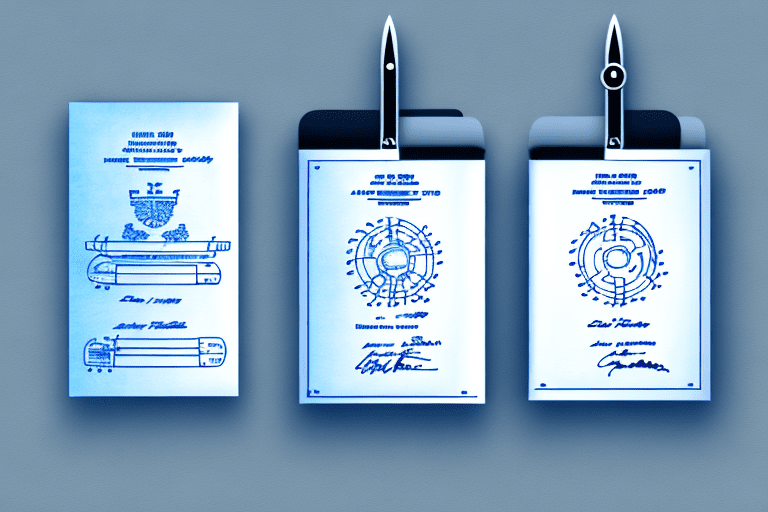Professional examinations are essential for individuals seeking specialized careers in various fields. These exams are designed to test the knowledge, skills, and abilities required to practice in a specific profession. Two prominent exams in the United States are the patent bar exam and the CFRE exam. Understanding the basics of professional examinations and the unique characteristics of these two exams can help individuals determine which one is right for them.
Understanding the Basics of Professional Examinations
What is a Professional Examination?
A professional examination is a standardized test that assesses the competency and proficiency of individuals in a specific professional field. These exams are typically administered by professional organizations or regulatory bodies to ensure that professionals meet the minimum requirements for practice. Professional examinations are comprehensive and cover a wide range of topics and knowledge areas relevant to the profession.
When it comes to professional examinations, it is important to understand their purpose and significance. These exams are designed to evaluate an individual’s knowledge, skills, and abilities in a particular professional field. They serve as a benchmark to measure the competency of professionals and ensure that they possess the necessary qualifications to excel in their respective careers.
Professional examinations are often structured in a way that tests various aspects of the profession, including theoretical knowledge, practical skills, and ethical considerations. They aim to assess the depth and breadth of an individual’s understanding of the subject matter, as well as their ability to apply that knowledge in real-world scenarios.
Importance of Professional Examinations
Professional examinations play a crucial role for both individuals and the professions they seek to enter. These exams help maintain high standards and ensure that professionals have the necessary knowledge and skills to perform their job duties effectively. Passing a professional examination is often a prerequisite for obtaining licensure or certification in many professions. It demonstrates a commitment to professional development and enhances credibility in the field.
Furthermore, professional examinations serve as a means of quality assurance, providing assurance to employers, clients, and the general public that professionals possess the required competencies to deliver high-quality services. By setting a standard for professional excellence, these exams contribute to the overall reputation and trustworthiness of the profession.
Professional examinations also encourage continuous learning and professional growth. The preparation process for these exams involves extensive studying and acquiring a deep understanding of the subject matter. This not only expands an individual’s knowledge base but also enhances their critical thinking, problem-solving, and analytical skills.
In addition, professional examinations often serve as a platform for networking and collaboration among professionals in the same field. Candidates who are preparing for these exams often join study groups or attend preparatory courses, allowing them to connect with like-minded individuals and share valuable insights and experiences.
Overall, professional examinations are an integral part of the professional development journey. They not only validate an individual’s skills and knowledge but also provide opportunities for growth and advancement in their chosen field. By upholding rigorous standards, these exams contribute to the overall excellence and credibility of the profession.
An In-depth Look at the Patent Bar Exam
The patent bar exam, also known as the United States Patent and Trademark Office (USPTO) registration examination, is a specialized exam for individuals seeking to become registered patent agents or patent attorneys. It focuses on assessing the knowledge and understanding of patent law and procedure, including patent application preparation and prosecution.
What is the Patent Bar Exam?
The patent bar exam is a rigorous assessment that evaluates the competency of individuals in the field of patent law. It serves as a gateway for aspiring patent professionals to enter the world of intellectual property and represent clients before the USPTO.
Passing the patent bar exam is a significant achievement that opens up a wide range of career opportunities. It demonstrates a thorough understanding of patent laws, rules, and regulations, as well as the ability to navigate the complex process of patent application preparation and prosecution.
The exam is administered by the USPTO, which is responsible for granting patents and registering patent professionals. It ensures that those who are granted registration have the necessary knowledge and skills to effectively represent clients in patent-related matters.
Who Should Take the Patent Bar Exam?
The patent bar exam is primarily designed for individuals with a technical or scientific background who are interested in practicing patent law. This includes individuals with degrees in fields such as engineering, computer science, chemistry, or biology.
Having a technical or scientific background is crucial in understanding the intricacies of patent applications, as it requires a deep understanding of the subject matter being patented. This knowledge allows patent professionals to effectively communicate with inventors and draft patent applications that accurately describe the invention.
Taking the patent bar exam is the first step towards becoming a registered patent agent or attorney. It provides individuals with the opportunity to represent clients before the USPTO and help protect their intellectual property rights.
While the exam is primarily targeted towards individuals with technical backgrounds, it is not limited to them. Individuals with a strong interest in patent law and a willingness to invest time and effort in studying the required materials can also take the exam.
Structure and Content of the Patent Bar Exam
The patent bar exam consists of two main components: the multiple-choice examination and the practical examination.
The multiple-choice examination assesses knowledge across various topics, including patent laws, rules, and regulations. It also covers ethics and professional responsibility. This portion of the exam tests an individual’s understanding of the legal framework surrounding patents and their ability to apply that knowledge to real-world scenarios.
The practical examination requires applicants to draft and prosecute a patent application based on a given fact pattern. This component evaluates an individual’s practical skills in preparing and prosecuting patent applications. It assesses their ability to analyze technical information, draft claims, and respond to office actions from the USPTO.
Both components of the exam are challenging and require extensive preparation. To succeed, individuals often invest significant time in studying relevant materials, such as the Manual of Patent Examining Procedure (MPEP) and other reference materials provided by the USPTO.
Many aspiring patent professionals also choose to enroll in specialized courses or review programs that focus on exam preparation. These programs provide comprehensive study materials, practice exams, and guidance from experienced instructors to help individuals navigate the complexities of the patent bar exam.
Preparing for the patent bar exam is a rigorous process that requires dedication, discipline, and a deep understanding of patent law. However, successfully passing the exam opens up a world of opportunities for individuals interested in pursuing a career in patent law.
Exploring the CFRE Exam
The Certified Fund Raising Executive (CFRE) exam is an internationally recognized certification for fundraising professionals. It assesses the knowledge, skills, and abilities required to excel in the field of fundraising and resource development. The CFRE credential demonstrates a commitment to professional ethics and best practices in fundraising.
What is the CFRE Exam?
The CFRE exam is designed to evaluate a fundraising professional’s understanding of key concepts and practices in the field. It covers a wide range of topics, including prospect research, relationship building, solicitation, stewardship, and accountability, as well as leadership and management in fundraising.
By successfully passing the CFRE exam, individuals demonstrate their competence and expertise in these areas, which can enhance their career prospects and open doors to new opportunities in the nonprofit sector.
Who Should Take the CFRE Exam?
The CFRE exam is suitable for individuals who work or aspire to work in fundraising roles within nonprofit organizations or institutions. This includes professionals in areas such as development, donor relations, and grant writing.
Whether you are just starting your career in fundraising or have years of experience, the CFRE certification can help you stand out in a competitive job market. It provides a level of credibility and expertise that is highly valued by employers and donors alike.
Additionally, the CFRE certification demonstrates a commitment to ongoing professional development and staying up-to-date with the latest trends and best practices in fundraising.
Structure and Content of the CFRE Exam
The CFRE exam consists of six main domains that cover different aspects of fundraising and resource development:
- Prospect Research: This domain focuses on the process of identifying and evaluating potential donors. It includes techniques for gathering information, analyzing data, and creating prospect profiles.
- Relationship Building: This domain explores strategies for building and nurturing relationships with donors. It covers topics such as donor cultivation, engagement, and stewardship.
- Solicitation: This domain delves into the art of making effective fundraising asks. It examines different solicitation techniques, donor motivations, and ethical considerations.
- Stewardship and Accountability: This domain emphasizes the importance of donor stewardship and accountability in fundraising. It covers topics such as gift acknowledgment, donor recognition, and impact reporting.
- Leadership and Management in Fundraising: This domain focuses on the strategic aspects of fundraising. It explores topics such as fundraising planning, budgeting, team management, and board engagement.
- Ethics, Accountability, and Professionalism: This domain addresses the ethical considerations and professional standards that fundraising professionals must adhere to. It covers topics such as donor privacy, conflict of interest, and fundraising regulations.
The CFRE exam assesses knowledge and skills in each domain through multiple-choice questions that require candidates to analyze and apply fundraising principles to real-world scenarios.
To prepare for the CFRE exam, individuals often engage in extensive study and professional development opportunities. This may include attending workshops, conferences, and courses specifically designed to enhance fundraising knowledge and skills. Many individuals also seek mentorship from experienced fundraising professionals to gain practical insights and guidance.
By investing time and effort into exam preparation, individuals can increase their chances of success and demonstrate their commitment to excellence in the field of fundraising.
Key Differences between the Patent Bar and CFRE Exams
Differences in Exam Content
The patent bar exam focuses on assessing knowledge and understanding of patent law and procedure. It tests applicants’ knowledge of the various statutes, regulations, and case laws related to patent prosecution. Conversely, the CFRE exam evaluates proficiency in fundraising principles, ethics, and best practices. It covers topics such as donor cultivation, relationship management, and campaign planning.
Differences in Exam Structure
The patent bar exam comprises both multiple-choice and practical components to gauge applicants’ theoretical knowledge and practical skills. On the other hand, the CFRE exam is a multiple-choice exam that assesses candidates’ ability to apply fundraising concepts in real-world scenarios.
Differences in Career Opportunities
Passing the patent bar exam opens doors to a career in patent law, specifically as a registered patent agent or attorney. These professionals have the unique ability to represent clients in patent matters before the USPTO. Conversely, the CFRE certification enhances career prospects in the fundraising field, enabling professionals to secure managerial or leadership roles within nonprofit organizations.
Ultimately, the choice between the patent bar exam and the CFRE exam depends on an individual’s career goals, interests, and educational background. Both exams offer distinct career paths and opportunities for professional growth. It is important to thoroughly research the requirements and expectations of each exam and consider how they align with personal aspirations. By choosing the right exam, individuals can embark on a rewarding journey in their chosen profession.






